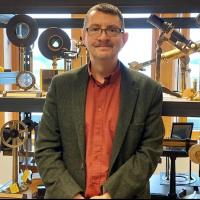General. John Dudley PhD FOSA FEOS FIEEE FInstP FSPIE DSc h.c. HonFRSNZ received B.Sc and Ph.D. degrees from the University of Auckland, New Zealand in 1987 and 1992 respectively. In 1992 and 1993, he carried out postdoctoral research at the University of St Andrews in Scotland before taking a lecturing position in 1994 at the University of Auckland. In 2000, he was appointed Professor at the University of Franche-Comté in Besançon, France. His research has been supported from diverse sources both nationally and internationally, including: the CNRS, the French National Research Agency (ANR), the Region of Franche-Comté, the European Commission, the European Office of Aerospace Research and Development, and the European Research Council.
Contributions and Publications. He has made particular contributions in the fields of ultrafast optics, supercontinuum generation and the science of rogue waves, and he has published over 270 articles in journals/books etc. and delivered over 190 invited talks at major conferences. His research has been extensively cited (19400 times Web of Science; 32600 times Google Scholar) and his h-index is 70/73/84 (Web of Science, SCOPUS, Google Scholar). He has acted as Chair or Co-Chair of many international conference events (including CLEO Europe, Photonics Global Conference etc) and has served in a number of editorial boards for major journals including as Associate and then Deputy Editor of Optics Express (OSA) and Editor in Chief of Optical & Quantum Electronics (Springer).
Awards and Distinctions. He has received a number of distinctions, including: the IXCore Fondation pour La Recherche Prize (2009); the Grand Prix de l'Electronique Général FERRIÉ of the Société des Electriciens et Electroniciens (2009); the Médaille d'Argent of the national French research agency CNRS (2013); the SPIE President's Award (2014); the OSA Hopkins Leadership Award (2015); the Institute of Physics (IOP) President's Medal (2016); the American Physical Society Dwight Nicholson Medal for Outreach (2017). He is a Fellow of the European Optical Society (EOS), the Optical Society (OSA), the Institute of Physics (IOP), the International Society for Optics and Photonics (SPIE) and the Institute of Electrical and Electronic Engineers (IEEE). He is also recipient of four honorary degrees: from the University of Bath, the University of St Andrews, Macquarie University and Tampere University of Technology. In 2019 he was awarded the Harold E. Edgerton Award of SPIE recognizing his contributions to ultrashort pulse measurements in nonlinear fibre optics. In 2020 he was awarded the R. W. Wood Prize of OSA recognizing his contributions to explaining and interpreting the physics of fibre supercontinuum generation, and was elected an Honorary Fellow of the Royal Society of New Zealand Te Aparangi. In 2022 he was elected an Honorary Member of the American Ceramic Society and in 2023 he was elected as International Fellow of the Chinese Optical Society. In 2024 he was joint recipient of the European Physical Society Quantum Optics and Electronics Division Prize for Research into the Science of Light.
Science Communication and Outreach. In addition to his research, he is committed to education and the public communication of science at the international level. He is an active member of a number of scientific societies and boards, and he served as the President of the European Physical Society for a two year term from April 2013-March 2015. In 2009, he initiated the International Year of Light & Light-based Technologies 2015 and chaired its Steering Committee until its successful final report and completion in 2016. He has participated in a number of high level panels and forums including events at UNESCO headquarters in Paris and the United Nations headquarters in New York, speaking at the Annual Meeting of the Public-Private Partnership Photonics 21 in Brussels, the World Science Forum, and others. Since 2018, he has coordinated follow-up actions with UNESCO in the frame of the International Day of Light which is a permanent and annual United Nations observance celebrating optical science and its applications. In the six editions to date, his leadership has seen the International Day of Light coordinate over 2500 events and campaigns in more than 100 countries worldwide, reaching a global audience of millions. In 2021, he helped design a campaign for the UNESCO International Day of Light focussing on increasing societal Trust in Science.
Education, the 1979 Feynman Lectures, History of Science. He has also taught at all levels (in English and French) from large undergraduate lectures to specialised graduate courses. He especially enjoys delivering popular science lectures with live experiments, including lectures and practical demonstration of the science of firewalking. He has also published popular articles on the history of physics, and while at the University of Auckland in New Zealand, he initiated and led the project to preserve and make publicly available Richard Feynman's lectures on quantum electrodynamics delivered in 1979. After moving to France he continued to work on this project (with the late Nobel laureate Sir Haryy Kroto and the Vega Science Trust) to make these vidoes more widely available. These have now been reuploaded to YouTube and have attracted over a million views. To celebrate the 600th anniversary of the Université de Franche-Comté in 2023, he has been leading a scientific heritage project establishing a Scientific Instrument museum within FEMTO-ST which contains over 200 catalogued historic instruments, many dating to the founding of the Faculty of Science in 1844. He has personally participated in the restoration of many of these instruments.

